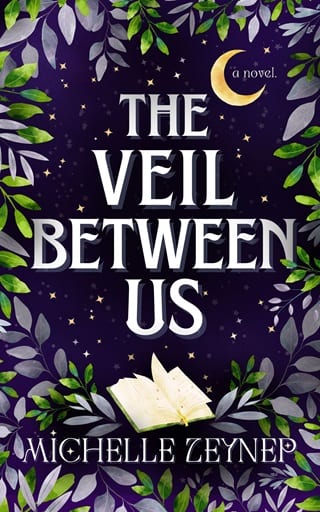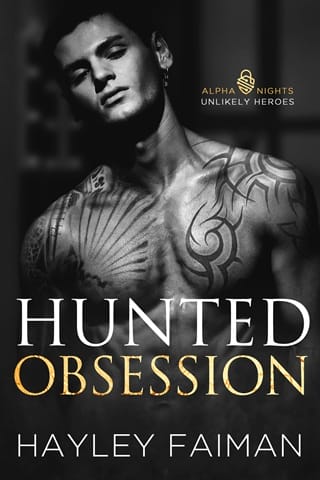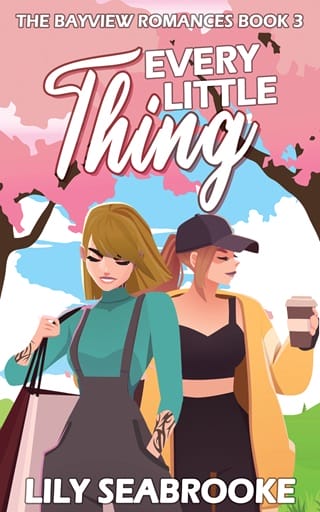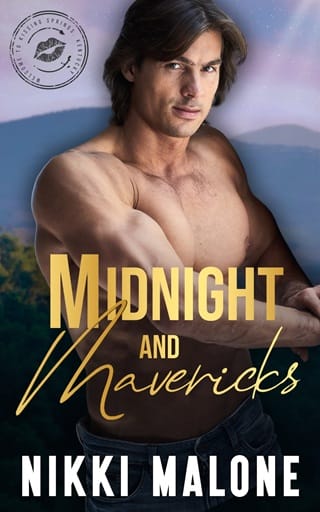9. Chapter 9
Chapter 9
T he moment Caroline’s feet are dragged from the threshold of the house, she groans. “Rency, I know that I am usually the one to get us into ridiculous situations, but this whole ghost thing is really just too much.”
“Are you okay?” I ask, kneeling down next to her prone body. Henry couldn’t touch her, so I had to pull her from the house, a clumsy process that made me wish Caroline was more waifish than toned muscle.
“I feel like I have the worst hangover to ever hang over.” She cracks her eyes open, winces, and turns her head back to face the earth. “Just let me lie here for a minute. I just need a second to breathe. That place was making me feel like I was stuck on one of those spinning carnival rides where you’re trapped and it’s ninety degrees outside and everything is distorted and whirling.”
Henry is watching the two of us with mixed expressions. He’s clearly trying to look concerned about Caroline, but every time I look at him, he’s laser-focused on me, his piercing, bright gaze leveled on my face. Once, he opens his mouth and closes it again, uncharacteristically speechless.
“Caroline, I think you are being feasted on by at least thirteen mosquitoes,” I tell her, swatting one off her leg.
“I don’t care. I am not going back in there.”
“We can go to my workshop. In the barn. If you want,” Henry suggests. “It’s between our houses.”
“What do you think, Caroline? Feeling up for it?”
“Up for what?”
I forgot that she can’t hear Henry unless we are touching. I smack another mosquito off her calf and then keep my hand on her leg. “Henry said we can go to his workshop in Karl’s pole barn.”
“It’s not so ghosty,” Henry supplies.
“Nuh-uh, no way. I’m not stepping foot into anywhere that I don’t know is firmly in the realm of the living and breathing. It’s Grandma Lydia’s place or nothing. Or at least, anywhere but this woods and your ghosty home and barn or nothing.”
“Let’s go to Grandma’s then. Think you can stand?” Caroline pushes herself up, brushing off the front of her shorts as she straightens.
“Already feeling better, although I have a pounding headache.” Her eyes scan for Henry but slide right past him. I loop my hand in hers and she does a double take when he pops into her line of vision. He lifts his chin, a very modern acknowledgment.
“I haven’t been in that house since before I died,” he says.
“Well, you’re not getting any younger,” Caroline grumps. I stifle a laugh against my hand when Henry makes a little noise of shock.
“What?” I say, unable to hold back my laughter when his eyes widen at my betrayal. “She’s not wrong.”
****
Less than two hours have passed since Caroline and I left Grandma Lydia’s house this morning, but something inside of me feels fundamentally changed.
The stairs creak at the same spots. The light slants into my bedroom in the same mid-morning manner, softened by the opaque flowing curtains. The paintings on the wall still smile with the same expressions.
But I feel different. There is a trembling inside of me, a shift that’s occurring, and I don’t know how to feel about it.
I invite Henry into the house as if I would anyone else. When we pass by the mirror hanging on my wall, Henry isn’t there. When he sits on the armchair across from where Caroline and I perch on my bed, the chair doesn’t groan in protest. The cushion doesn’t press against his body.
Once outside, I realize I never noticed how his feet don’t leave an indent in the earth. How his form doesn’t cast a shadow. Now, it’s all I can focus on.
“So, what’s wrong with your house?” Caroline asks, flopping down on my bed. Her ankle is tossed over my own—connecting her to me to Henry in a bizarre chain of human-to-ghost contact—and she tosses an arm over her eyes, blocking out the light.
“It’s been… inconsistently in the physical world for a while now. I suppose it’s completely gone at this point. I didn’t know.”
“Is that… normal?” I ask.
Henry shrugs and leans forward, tipping toward me in his seat. “I don’t think so, but I don’t have any other data points to refer to.”
“But you must have theories, right?” I press. “Some idea of why the little house could just… cease to exist.”
“Of course. But I don’t know for sure.”
“Give me an example. What’s one theory?”
“The simplest is that it, like objects that I choose to take with me, has inadvertently been pulled into the in-between space I occupy. The veil between life and death, if you will. It’s my house—well, half my house, depending on how you think about how it’s on both your family’s property and on my own. I’ve spent most of my time there since I was zapped, so it’s just faded from this layer of existence and into my own.”
“I changed my mind,” Caroline interrupts. “Talk about the house later and the touching now. That seems way more interesting.”
Henry’s fingers twitch at the mention of touching.
“I don’t know,” Henry says, disbelief and awe mixing in his expression, his tone. “Ever since I met you, things have been… strange.”
“Tell me about it,” I say, scoffing. “I just met a ghost.”
“And his ghost cat,” chimes Caroline.
“Having nearly a hundred years of ghostly normality disrupted is pretty significant. In the past, I could only be seen by people I’m related to. And,” he adds, looking between the two of us, “I know we don’t share any blood. Lydia and her family line would have been able to see me any dozen of the hundreds of times we have crossed paths if that were the case. So I’m not sure how you can see me, let alone how we can touch.” His voice catches just slightly at the word.
“Well, we are family now , aren’t we?” Caroline asks, sitting up. Her expression is back to its playful set, and her eyes have a near-devious glint in them.
I immediately understand where she’s going with this.
Henry’s eyes narrow. “Come again, Caroline?”
Caroline points between Henry and me. “Since you two are married. That makes the three of us family. I’m an in-law.”
“I think I would remember getting married,” Henry points out. “I remember my last almost-wedding quite clearly.”
My heart is beating so fast in my chest that I start to feel lightheaded. Henry’s eyes glide past my face only to dart back to it.
“Are you feeling okay? You don’t look so good. ”
“Um, we are married, I think,” I blurt. “Caroline is right. I’m sorry, I don’t know what came over me. I just saw my name there, and I took the pen, and I signed, and I—” There’s a crease between Henry’s eyebrows, and the frown only makes me ramble more. “I can’t explain it. There’s no excuse. It wasn’t mine to sign and—”
“Breathe, Rency,” Henry says, leaning forward. He looks like he wants to touch me in reassurance, but his hand falls away before it makes contact. “You’re panicking. And Caroline, stop laughing and help explain what’s going on here.”
Caroline has to catch her breath before she can continue, too, although for totally different reasons. “We were at the funeral home and saw your marriage license last month,” she explains, draping an arm around my shoulders. “They found it and a newspaper article about you and your fiancée in their files and had it on display. You had signed it, Florence hadn’t. But Rency ended up signing for her and, well, I guess the marriage took after all. Looks like necromancy isn’t dead after all!”
“Necro gamy , Caro,” I say, briefly covering my face in embarrassment.
“If necromancy was allowed, it would solve a lot of my problems,” Henry says. There’s a little smirk pulling on his lips. I can’t believe he’s joking at a time like this.
“I am so sorry,” I repeat, looking away. “Are you mad?”
“Not mad,” he says, sitting back in his chair, expression inscrutable and contemplative. “I’m feeling a lot of things. But not anger.”
“I don’t know what happened. Why I felt so compelled to sign it. And I definitely didn’t think that I was somehow disorienting some sort of ghostly rulebook.”
Henry shrugs. “What’s done is done. We might not be married by a pastor, but clearly some cosmic force says that signing that piece of paper is enough to connect us.”
“We’re… married?” I ask, heart pounding.
“Well, something thinks we’re married,” he echoes. His voice lowers, gets deeper, quieter. “That you’re my wife.”
Caroline cuts through the thick tension building between us. “Congratulations!” she declares, laughter in her voice, “Let’s cut the cake!”
Caroline has to leave around noon, but we manage to cover a lot of ground before she leaves. While I’m most curious about how it’s possible for me to be so connected to his past via the dreams (he doesn’t know) and if those dreams are accurate (he thinks they are, even though I can’t remember all of the details), Caroline is more focused on how he got the ghost cat (he tried to pick him up and help him when he found him hit by a car, which shouldn’t be possible since he can’t touch any living creature, but somehow, right on the threshold of life and death, the cat detached from its physical form and became a ghost) and what the cat’s name is (Spectre, which is French for ghost, but to my untrained ear just sounds like “Speck” with an accent).
When it’s time for Caro to go, she waltzes out of the room with a finger wiggle and a “You two be good without me, now” that leaves me blushing. I trail after her to her car, leaving Henry sitting on my bed, surrounded by gauzy curtains and perched on my favorite handmade quilt.
“Well, I feel weird leaving you here alone with him, but I guess it’s not like I could stop him from doing anything in the first place since, ya know, he’s a ghost.” She elbows me playfully in the arm, laughing. “A ghost that you are somehow married to. Handyman Henry is now your ghost husband.”
The thought tightens my throat and chest. I feel underwater, submerged in a bizarre alternate reality. I know that this isn’t how legal marriages work, even—there were no witnesses, it’s not notarized, the groom died a hundred years prior —but the strange connection between Henry and me makes it hard to deny the way the paper has somehow sealed the two of us together. I broke a rule, and now these other rules are broken: I can see him, he can touch me, we are married.
“Hey, don’t look so glum about it,” Caroline teases. “He’s just as hot in real life as I thought he would be. Kinda like a young Jude Law with darker hair.”
“Caroline,” I sigh. “I’m freaking out and you’re all jokes. What am I going to do? This is insane! I can’t be—I feel—he’s a ghost , Caroline.”
My cousin’s expression turns sympathetic. “Sorry, I didn’t mean to minimize how you’re feeling. I was just trying to cheer you up. I don’t know what to make of it. I don’t even know if I should tell Javi about it—he might think I’m a complete psycho and since we aren’t married, I doubt he’d be able to see Henry, so I wouldn’t have any way to prove it to him. But don’t worry. We will figure it out. I have a wedding to shoot tomorrow, but I’ll come over on Sunday?”
“Promise?”
“Yes, I swear.”
We hug, and I stay outside as her car pulls away in a cloud of dirt road dust.
Upstairs, Henry hasn’t moved. He fits in with the aesthetics of the room somehow, even though his body doesn’t curve the quilt underneath him and his hair doesn’t move when the summer breeze pushes in through the window. Maybe it’s because he’s classically handsome—that he could fit in with any space. Like he’s timeless—or out of time itself.
His eyes snap to me as I enter, and in spite of the casual way he leans back, palms behind him on the quilt, being alone with him brings to mind how it must feel to be alone with some prowling creature. Tense, energized. An unknown amount of danger, maybe. But there’s an allure there, too.
It’s just him and me now.
Without Caroline’s chatter between us, I don’t know what to say or how to move. It wasn’t like this before, when he was the man fixing up my grandmother’s house.
Before I knew he was a ghost.
Now, I don’t know how to act. I’m brimming with questions but with no sense of how to ask them. I want to sit across from him, cross-legged against the headboard, and ask him about what happened that night his aunt burst into the little house in the woods. I want to hear what it has been like to watch the world change, to see history unfold in front of him. If he’s lonely.
I want to know if he was in love with Florence.
If he still loves her.
I don’t ask any of these questions. Instead, I go to the window and look out towards his house. In the bright summer sun, there is no hint of a glowing light in the dark woods, just lush green foliage. It seems impossible that I could catch the smallest glimpse of his home.
“You have more questions,” he says, breaking the silence between us.
“Of course.”
“You should ask them.”
I look over at him, trying not to admire the way the light brightens his already shocking eyes, or how it adds a glow to his hair that brings out the deep reds among the brown. He usually looks like a brunette, but in this light his hair looks like an impossible, unreal color, something only brushed onto a canvas.
“I don’t know where to start. I don’t want to bring up any… bad memories.” I would never discuss the circumstances of someone’s death in as vivid detail as I want to with Henry. It feels like a violation .
“I’ve had a lot of time to process, believe me. And I want you to know. Well,” he revises, “if you want to know, I want to tell you.”
“Why?” I say, turning fully to face him. “Why do you want me to know? I… I’m leaving in six weeks. I can’t… I don’t know anything about curses or ghosts. We barely know each other.”
Henry shrugs, but I can tell the nonchalance is feigned. “Everyone leaves, eventually. Nothing is permanent. Still, we are connected. And whatever that means, for however long that lasts, I don’t want to let that slip away. So, don’t hold back. You’re curious, so ask.” He pushes himself away until his back is against the headboard and, as if he had read my mind, he pats the spot next to him.
“Start at the beginning, then,” I say, slipping into the spot.
“How far back?”
“As far as you’re willing to go.”
****
He begins back when he was still alive.
“I’m the youngest son in my family. When I was three, my uncle lost his wife and only child in childbirth. He was only nineteen. They’d been living with my family, and he’d grown attached to me—started to see me like his own son, in a lot of ways. By the time I was ten, I was helping him with his carpentry business. That’s how he met Mallory. She was his second wife and the woman who cursed me. We were on a job, in the city at a huge mansion, and well, she liked the look of my uncle. Liked the look of his prospects, too. My grandfather owned the grocery store in Oak River. He was successful, well-known even in the city. So she assumed that my uncle would inherit a lot of money. They got married—and she brought a lot of money with her. My uncle never touched it, told her she should spend it however she wanted. But just a few months after they got married, my grandfather died. And in his will, he did give my uncle quite a bit, but with specific instructions that he use it for his family—to invest in the future.”
Henry speaks with a neat precision. I wonder if he has told himself this story before. If he worries about forgetting it, in losing the details in the swirl of the passing decades. Does he picture each detail of those days? Does he remember what it was like to learn a trade, to travel into the city?
“My aunt Mallory was not happy about this stipulation. She wasn’t that much older than me—I was eighteen when they got married, and she was twenty-five—and she had expectations about what her life would look like when my grandfather died. And when she didn’t get her way, she was… well, she made my uncle’s life less than pleasant. By then, he had a nice house—in town, even, not out here—but she wanted a bigger one. She wanted to spend more and more on fashionable clothes and new gadgets, and nothing seemed to ever be enough.”
Henry looks at me from the corner of his eye, a smile tugging on his lips. “It might not seem revolutionary, but he bought her a refrigerator. And they had a nice car. Someone came and cleaned their house for them, even, and did their laundry. They were, by all standards but her own, well-off. But she tried to get back at my uncle for his unwillingness to spend the money. He wanted to save it for their children. She didn’t think it mattered.”
“What does that have to do with you? With what I saw in the dream?” I ask. “She cursed you, not your uncle. But he was the one with the money. So why curse you?”
Henry shifts, angling his body towards mine. Our knees bump, then rest next to each other. I don’t move away, but after a heartbeat, Henry does. “My uncle would not have spent that money on me, just to be clear, even though he saw me like his own son and treated me like it, too. We worked next to each other, relied on each other for the success of the business. When Mallory didn’t get what she wanted, she lashed out. Tried to ruin his reputation locally. Some of it was petty and hardly worked; other parts did some damage. She lied about him at businesses and at church; she tried to say that his work was worthless, that sort of thing. But none of it would change his mind. I think it became an ethical issue for him—if he caved, after being so adamant, it would be a direct violation of the principles he had said he believed in so firmly.”
Henry scoffs. “She was so angry when my father built the house—the one that just burned down. She said she should be living someplace just like it. That if my father could build one with the money, so could my uncle. He didn’t want to build something so big just for the two of them. Said it was a waste. Eventually, she turned that anger towards me. She told him some lies that I called her out on, which made her lie about me in retaliation. She claimed I stole money, even. He didn’t believe it, but we had some… strained moments between us, that’s for sure.”
“Your uncle believed you over her?”
Henry slowly nods. “Yeah. And it made her angry. I think she didn’t know I knew how she was trying to ruin the relationship between my uncle and me. And then… Well, one evening, she came on to me. I rejected her. I was engaged to Florence; Mallory was my uncle’s wife. There was no way that was happening. It was, I guess, the final straw.”
“Because then she cursed you.”
“Yes.”
I think back to the dream—how she had lunged at him, how she had threatened to curse him, a small book clutched in her hand.
“In my dream, I always wake up after she says she is going to curse you. What happened after?”
Henry runs a hand through his hair, ruffling it up. I want to run my hands through it too, but I suppress the desire. Not only is it completely inappropriate—Henry and I are not in a real relationship, after all—but he’s a ghost.
Henry is a ghost . It’s going to be my new mantra. Something has to keep my emotions in check.
“She cut off a piece of my hair, threw it in the lantern she had brought with her, shouted a curse at me from a book, and then left.” His hand goes to his hair where, preserved through history, there is a sudden unevenness in the cut .
“That’s it?”
“That’s it,” he agrees, nodding. “I… I thought she was crazy. I mean, really, what was I supposed to think? That she had actually cursed me?”
“But she did. And then you died.”
“Yes. But, interestingly enough, so did she. That same day. I didn’t find out until a few days later. She’d traveled back to the city and that night, in her parents’ mansion there, she died. I truly thought she was gone. I didn’t know how, but I always felt like it must have been some strange cosmic karma. That somehow her strange curse had killed her as a sacrifice or something. But then, last night, I saw her again.” He laughs, incredulous. “I guess she’s a ghost too. So I’m not sure about that theory anymore.”
The pieces begin to click into place. The people he was talking to last night—a woman and a man.
“At the fire—that was her? With some guy?”
“Exactly.”
“But you’ve been dead for years. How did you not know?”
“I don’t make the rules about being a ghost, but I’ve pushed them as much as I could. One of the rules I can’t ever seem to break is the space I’m bound to. The family property and the places I went on the day of my death are the only areas I’ve ever been able to walk through. She must have a different radius than me… or maybe different rules. I don’t know. I don’t understand it. I didn’t get a ‘Welcome to the Veil’ rulebook when I died.”
“You’ve been stuck here, in this little corner of Oak River? This whole time?”
“That’s right.”
The thought horrifies me. I like it here, sure. But to spend a hundred years in just a slice of this small town? At my expression, Henry tips back his head and laughs. “It’s not as horrible as you seem to think it is. After all, I’d hardly been anywhere at all before my death, and it’s not like I could talk to anyone other than my closest family, anyway. And sure, the first sixty years were a bit of a slog, but the Internet has been a welcome expansion of my world these past few decades.”
I want to ask about that more—about the Internet and cell phones and watching technology develop, and can he even use a phone? How does he pay his phone bill? My brain is filling up with questions, but I hold them back, refusing to be distracted. “Is it because of me?” I wonder. “That suddenly you’re overlapping with Mallory?”
Henry shrugs. “I’m not sure. I…” He pauses. Blinks. “I’m just now realizing that maybe I’m not bound here anymore. I was able to walk more fully on your land than I have been in the past,” he says slowly. A line appears between his eyebrows, contemplative. “That… that would also be new.”
“You could leave, then.”
“I suppose so. Like I said, I don’t make the rules, I don’t really understand them all. So who knows.” He wets his lips. “That would change a lot for me.”
“Do you think—”
Downstairs, a door slams .
Grandma Lydia is home.
I scramble to my feet. She’s pretty relaxed for a grandparent and I’m fully an adult—job, healthcare, the whole enchilada—but that does not mean that she’d be cool with me having a guy up here with me.
“I’m home!” she declares, her voice carrying up the stairs. “I hope you didn’t sort too many boxes without me!”
“Don’t worry, I didn’t!” I call back, leaning out of my room to call back to her. I turn back to look at where Henry is sprawled out on my bed, relaxed and unbothered. “Hide or something,” I hiss.
His smirk is playful, a bit teasing. “Rency, I’m a ghost. She can’t see me. Just don’t hold her hand, and I’ll walk down the stairs and out of the house without any problem.”
I’m immediately embarrassed. Of course. He might be tangible to me—clear in my vision, solid and fully formed—but to everyone else, he’s a ghost.
He’s a ghost to you too, Rency , I remind myself.
“Right,” I say. “I—okay. Yes. You’ll be fine?”
“Yes. If you hear the screen door close, then no you didn’t. But yes. I’ll be fine.” His eyes dart up and down my body, a quick perusal that I nearly miss. “More than fine.”
“And… I’ll see you later?”
“Of course. I’m not going to go wandering off, Rency. Not since…” He stops himself from saying the rest of that sentence. “No,” he says. “I’ll be here.”
Not since what? I want to ask. Not since meeting me ?
I’m stuck at the threshold. I feel unable to leave, worried that leaving will turn him into the same sort of ghost he is for everyone else. That I’ll blink and he’ll be gone.
“It’s okay, Rency. Really.”
“Really?”
He nods, not breaking eye contact. “Really. I’ll see you later. Go see Lydia.”
As I creak down the stairs, I strain my ears to hear him, to know if he’s following. To know if he’ll slip out the door right behind me to slide away into the claggy afternoon heat and melt away, ephemeral and imagined.
When I glance behind me, he’s not there. But not that much later, I hear the soft impact of wood on wood as the screen door meets the frame, and I know that he’s slipped away.
 Fullepub
Fullepub 



